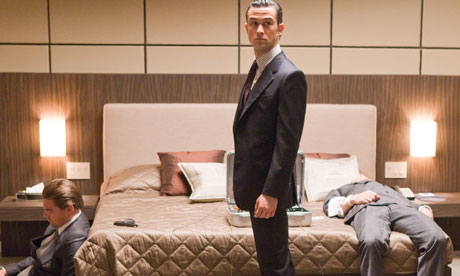 As a rule, I tend to hate dream sequences in movies.
As a rule, I tend to hate dream sequences in movies.Occasionally, a dream sequence works. Polanski pulled it off in Rosemary's Baby. The scene was not only freaky and horrific (it's the part where Mia Farrow gets raped by Satan) but had the surreal, just-a-little-bit-off sensation of reality that's minutely distorted.
But for the most part, trying to have your characters dream on screen almost always winds up looking silly.
While Michel Gondry's film, The Science of Sleep, might have actually pulled off something akin to on-screen dreaming -- in which things happen that don't make any sense; in which characters come and go without explanation; in which things are repeated throughout the dream with a different shade of meaning each time -- The Science of Sleep was a little dull.
One thing Inception has going for it: It isn't dull.
Flaws aside (and the film has many) it's fairly exciting.
Leonardo DiCaprio plays an industrial spy who has figured out the technology that allows him and his team of experts to invade a person's dream. The director, Christopher Nolan (of Memento fame), spares us any explanation of how this is possible, but instead constructs a clever thriller about how DiCaprio and his crew are hired by a Japanese billionaire with the intention of planting an idea into a rival's unconscious mind -- a feat which is apparently far more difficult than just entering a subject's mind for the purpose of extracting some piece of secret information. (Why? You have to cut this movie some slack.)
When DiCaprio et al. are rummaging through a mark's dreamscape, they know where to find the juicy stuff. (There is always a safe or a fortress in a man's dreams where he keeps his deepest and darkest goods.) They know how to change the landscape to their liking (they hire an architect played by the adorable Ellen Page to do this). And when the movie is going into dreams within dreams -- when the characters are dealing with all sorts of unexpected problems in the dreamer's mind, when they're level-headed and conscious even as the surreal and unexpected are happening to them -- is when the movie's at its best.
When DiCaprio's mark (Cillain Murphy) has been drugged into a deep sleep and he encounters DiCaprio and his men, he senses that something is not right and freight trains and bands of armed men show up to protect him. (He was trained to resist this kind of industrial espionage. Apparently, DiCaprio is not the only person in this dream espionage business.)
DiCaprio must fight his way through Murphy's mind. And they are not only fighting off Murphy's "projections", they also have to contend with DiCaprio's former wife -- a ghost who keeps showing up around DiCaprio to sabotage him.
DiCaprio is excellent -- as he almost always is. His team of dream thieves are also quite good. (I particularly liked the rouge Englishman, Tom Hardy.) Where the movie is weakest, I think, is when it gets too deep into DiCaprio's backstory with his former wife. He must "confront" her -- which I really could have done without. There is some nonsense about not knowing what's a dream and what's real. (Yawn.)
But when they are on a mission to penetrate someone's dream life, the movie is quite good. An action movie taking place in a man's head? Yup, it works.










